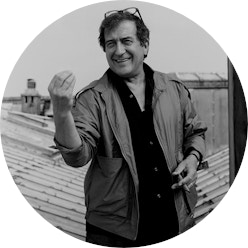
Luciano Berio
October 24, 1925 - Oneglia — May 27, 2003 - Rome (Italy)
About
Born in Liguria (Italy), into a family of music lovers and composers, Luciano Berio moved to Milan at the age of 20. There he attended the Conservatorio "Giuseppe Verdi", studying composition with Giulio Cesare Paribeni and Giorgio Federico Ghedini, as well as conducting with Carlo Maria Giulini and Antonino Votto. In 1952 he attended the courses taught by Luigi Dallapiccola at Tanglewood, USA.
In the early fifties, Luciano Berio started being known as an ambassador of the new generation of the musical avantgarde. His major works at the time are Cinque Variazioni (1952-53), Chamber Music (1953), Nones (1954) and Serenata (1957).
In 1954, Berio and Maderna created Italy’s first studio of electronic music at the RAI Milan headquarters, inaugurated the following year as the Studio di Fonologia Musicale. This is where he got initiated to experimental music and composed Momenti in 1957 and Différences in 1958-59. Famous composers such as John Cage were invited at the studio.
During the following decade, Berio explored various combinations of timbres, and started investigating the expressive resources of the female voice – prompted by the voice of Cathy Berberian whom he married in 1950. This is the period in which he worked with poets such as Sanguineti.
In the late 1950s, Luciano Berio started investigating the potential of the timbres of each instrument: that is why he initiated a series of works for solo instruments (the last, for violoncello, was completed in 2002-03).
In his various creative phases the composer invariably tried to relate music to various fields of knowledge: poetry, theatre, linguistics, anthropology and architecture. His interest in the multiple expressions of human musicality led him to return again and again to various repertories of the oral tradition (Folk songs, 1964; Questo vuol dire che…, 1968; Cries of London, 1974-76; Voci, 1984). He explored the vast patrimony of Western music in his adaptations of Monteverdi (Combattimento di Tancredi e Clorinda), Bach (Contrapunctus XIX), Boccherini (Ritirata notturna di Madrid), Mozart (Vor, während, nach Zaide), Schubert (Rendering), Brahms (Op. 120 N. 1), Mahler (the two cycles of Frühe Lieder), Puccini (the Finale of Turandot), and more besides. His ideal of uniting the various dimensions and traditions of successive civilizations can also be seen in such works as Sinfonia (1968), Coro (1975-76) and Ofanìm (1988-92), this last work preparing the ground for his last two theatrical works.
Music theatre constituted a fundamental focus for Berio’s research and poetics. After the first works for the stage in the fifties and sixties (Allez-Hop, Passaggio), he conceived his first musical action organized in three acts with texts he wrote himself: Opera (1969-70/1977). This was followed by La vera storia (1977-79), text by Calvino, Un re in ascolto (1979-83) with texts by Calvino, Gotter, Auden and Berio, Outis (1992-96) with texts by Dario Del Corno, and Cronaca del Luogo (1997-99) with a text by Talia Pecker Berio. A special place was occupied by A-ronne (1974-75), a radio documentary for 5 actors (reworked in 1975 for 8 voices) with a text by Sanguineti, the culmination of the experimentations for radio that Berio undertook in the fifties.
Luciano Berio died in Rome on 27 May 2003. Berio’s commitment to music extended to other activities including conducting, the conception of concert series and the promotion of contemporary music (notably Incontri Musicali, a journal and series of concert cycles inaugurated in 1956). He taught at prestigious musical and academic institutions in Europe and the USA (Darmstadt, Dartington, Tanglewood, Mills College, Juilliard School, Harvard University). In 1993-94 he gave the Charles Elliot Norton Lectures at Harvard. From 1974 to 1980 he directed the department of electroacoustics at the IRCAM, Paris, and in 1987 he founded the Centro Tempo Reale in Florence. He was the recipient of numerous international awards (Siemens Prize; Wolf Foundation Prize; Leone d’Oro alla Carriera, Venice Biennale; Imperial Prize for the Arts, Japan) and four honorary degrees (from City University, London and the Universities of Siena, Torino and Bologna). From 2000 he was President of the Accademia di Santa Cecilia in Rome where, under his supervision, the new Auditorium Parco della Musica was inaugurated in 2002.
Source: www.lucianoberio.org. © AIDB (Transl. by Mark Weir)
- More pictures of Luciano Berio in the Guy Vivien Gallery

